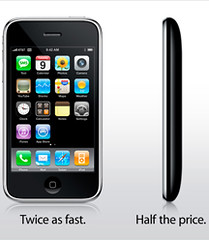When you visit the Web site of screenwriter and producer Rob Thomas, his work is divided into sections: Books, Film, Television, Music, and Personal Info. But one more category remains on the top of a site that hasn’t been updated since one of his projects received the green light for season two — and that would be Veronica Mars.
By all accounts, Thomas seems as dedicated to Veronica Mars as the fans are to him. I know the fans are, because every few weeks they send me an update on their activities to grow a show that was prematurely cancelled after its third season.
Sure, fan outcry from cancelled television shows has become commonplace, with everyone from Moonlight to October Road giving it their best shot. But there is one thing unique about Veronica Mars fans. They remain optimistic realists — people who accept that Veronica Mars is unlikely to return to television, but may one day see a second life with a Veronica Mars movie.
The secret to their continued success? They have several small but memorable programs in place. I was introduced to one of them last March when they asked me to “try watching three or four episodes” and see if I wanted to watch the rest of the season.
Although the question was padded, because I was already watching season three via iTunes, I gave season one a shot. Four busy months later: my family couldn’t watch three or four shows. They had to watch them all.
They are now waiting for me to order season two from Amazon.com, which will be right after I send the “loan it forward” DVD set to its next destination this week. It’s headed cross country to a blogger who might appreciate the high touch approach to consumer marketing if not the show on its own merit.
If he watches a few episodes into disc two, he might become another fan and then “loan it forward” again. After all, there is something smart about the writing in this enduring series as the primary story arches develop. Coincidently, I felt the same way about season three. The set-up doesn’t seem as strong as the middle, but it eventually becomes vital to the underlining story.
Is it working? Considering one of the fans recently presented actor Jason Dohring (he portrayed Logan) with a scrapbook full of fan letters and artwork and the fact that Veronica Mars is still being positively mentioned in the press again and again, they seem to be doing something right. And in some ways, perhaps, better than anyone else.
Sure, our friends and Jericho fans are still sending nuts, but the Veronica Mars campaign continually captures more fans and friendly media attention without the hazard of having already had its second chance.
But more importantly, after watching two seasons of Veronica Mars, I’m won over with the logic that it just feels like big screen material. Provided Rob Thomas is in the driver’s seat and some of the cast continues to show an interest before they get too old to play their parts, it really could work as an alternative to the consistently typical summer blockbusters that tend to grace the screen.

By all accounts, Thomas seems as dedicated to Veronica Mars as the fans are to him. I know the fans are, because every few weeks they send me an update on their activities to grow a show that was prematurely cancelled after its third season.
Sure, fan outcry from cancelled television shows has become commonplace, with everyone from Moonlight to October Road giving it their best shot. But there is one thing unique about Veronica Mars fans. They remain optimistic realists — people who accept that Veronica Mars is unlikely to return to television, but may one day see a second life with a Veronica Mars movie.
The secret to their continued success? They have several small but memorable programs in place. I was introduced to one of them last March when they asked me to “try watching three or four episodes” and see if I wanted to watch the rest of the season.
Although the question was padded, because I was already watching season three via iTunes, I gave season one a shot. Four busy months later: my family couldn’t watch three or four shows. They had to watch them all.
They are now waiting for me to order season two from Amazon.com, which will be right after I send the “loan it forward” DVD set to its next destination this week. It’s headed cross country to a blogger who might appreciate the high touch approach to consumer marketing if not the show on its own merit.
If he watches a few episodes into disc two, he might become another fan and then “loan it forward” again. After all, there is something smart about the writing in this enduring series as the primary story arches develop. Coincidently, I felt the same way about season three. The set-up doesn’t seem as strong as the middle, but it eventually becomes vital to the underlining story.
Is it working? Considering one of the fans recently presented actor Jason Dohring (he portrayed Logan) with a scrapbook full of fan letters and artwork and the fact that Veronica Mars is still being positively mentioned in the press again and again, they seem to be doing something right. And in some ways, perhaps, better than anyone else.
Sure, our friends and Jericho fans are still sending nuts, but the Veronica Mars campaign continually captures more fans and friendly media attention without the hazard of having already had its second chance.
But more importantly, after watching two seasons of Veronica Mars, I’m won over with the logic that it just feels like big screen material. Provided Rob Thomas is in the driver’s seat and some of the cast continues to show an interest before they get too old to play their parts, it really could work as an alternative to the consistently typical summer blockbusters that tend to grace the screen.





















